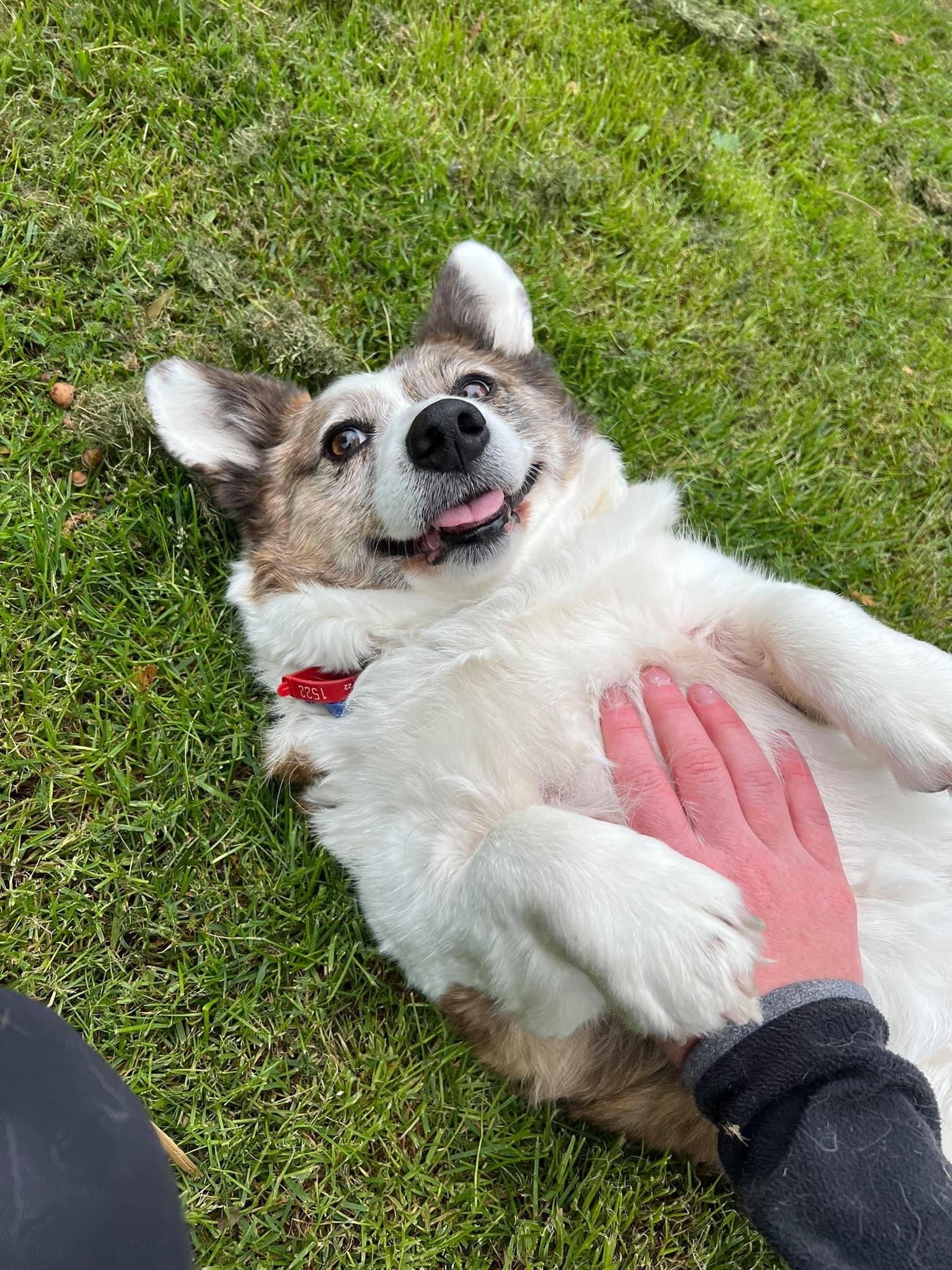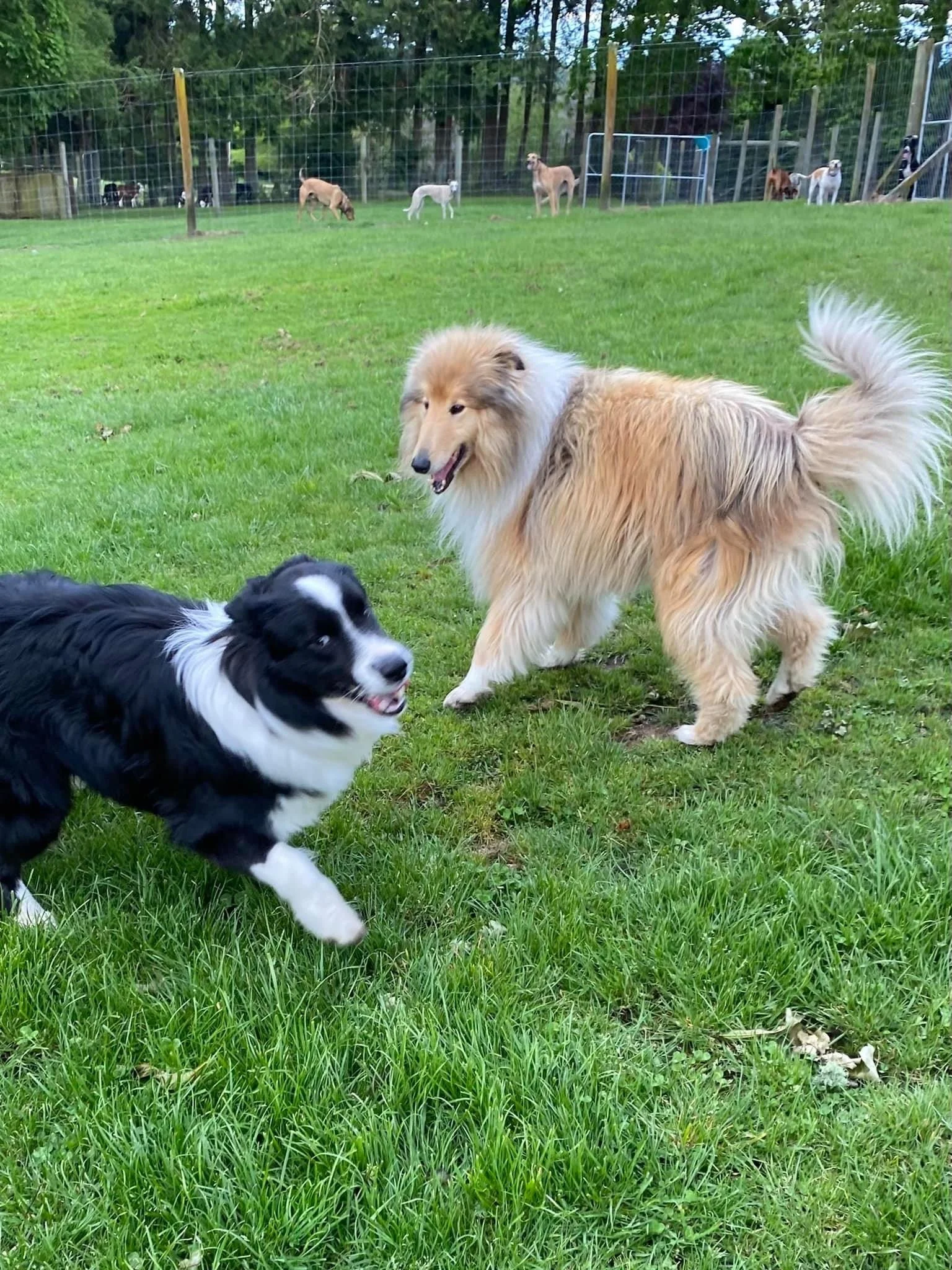Dogs
Dog Kennels at Taupo Centennial Park Kennels & Cattery are cleaned twice a day. All dogs get out for morning and afternoon excercise. every day. Taupo Centennial Park Kennels & Cattery have 32 indoor kennels and 8 large outdoor Kennels.
During their stay dogs are exercised twice in our fenced grass paddocks. They are let out in our fully fence secure area with other similar sized dog and breeds. If your dog does not play well others please let us know at the time you check in so we can ensure safety all our dog guests including your own.
Whilst dogs are our exercising all occupied kennels are thoroughly cleaned. Kennel’s are cleaned out twice daily ensuring a clean hygenic environment during your pets stay.
Feeding is done twice a day for all dogs. If your dog has any special dietary requirements you must let us know a few days before they are due to stay, to ensure we have time to arrange food with you. If special diet, dog owners can arrange to bring own food (enough for duration of stay). There is NO difference in price for the stay if bringing own food.
Dog food provided by us is a quality dry food, we can replace with wet food upon request.
Pet drop off and pick up times are only available during our opening hours.
Special Requirements
If your pet is on any specific medication we can administer this on your behalf. Please ensure clear instructions and information is on the medicine before checkin, just in case we need to recheck with a qualified Veterinarian. Please note there may be additional charges depending on additional care your pet may require. You are welcome to bring your pets own bedding and favourite toy. We do not take responsibility for any of these items.
Pick up & Drop off’s
Pets can only be dropped off and picked up during opening hours. When dropping off please remember to ensure your dog has a collar. We need to be able to move the dogs around the kennels especially on arrival and departure from the Kennels. Note depending on the drop off and pick up time you chose half day costs may apply. Fill out the booking/Quote to check price and availability today.
Compulsory Vaccinations
If you do not have proof of vaccinations for your pet then we will not be able to house your dog. It is important for the safety of all pets staying with us we can identify they are vaccinated. If unsure contact your Vet today and get a Vaccination Card. If you are a regular customer we can keep the Vaccination Card on file.
Canine cough epidemic in NZ
The current epidemic of canine cough is a normal occurrence in New Zealand and is caused by disease agents already present in New Zealand (i.e. it is not an exotic disease agent).
It is not related to COVID-19, and it is not zoonotic (not transmitted from animals to humans). Good hygiene measures should always be used when dealing with animals, and particularly sick animals.
Do not put masks on dogs.
What is canine cough?
Canine cough is a common, contagious, infectious upper respiratory disease, seen in dogs.
Canine cough may also be referred to as kennel cough or (acute) canine infectious tracheobronchitis. It is highly infectious but is not often fatal (high morbidity, low mortality).
It is like the ‘common’ cold in people but is confined to dogs. Clinical signs may include:
loud, high pitched cough, often described as a “goose honk”
loss of appetite
lack of energy
retching or hacking
nasal discharge.
Bouts of coughing can last for several weeks and may be exacerbated by exercise.
Veterinary treatment may be required to alleviate these distressing clinical signs.
Vaccination
While vaccination is an important part of your dog’s health care plan, not all of the agents that cause canine cough are included in the available vaccines. Effective vaccination does reduce the severity of canine cough and remains an important cornerstone in managing the disease.
What to do?
If your dog is showing clinical signs or has been in contact with another dog that has canine cough, isolate your dog at home and call your veterinarian for further advice. Your veterinarian may authorise some treatment for the cough (especially if your dog has other conditions such as heart disease), but medications such as antibiotics will only be authorised if your dog has signs of bacterial infection such as a fever or lack of appetite.
Remember to ring ahead to organise how and when to present your dog to the clinic - this means appropriate hygiene and infection prevention measures can be used to keep other dogs safe, if your dog does have canine cough
What causes canine cough?
Canine cough is a multifactorial disease. Several viruses and bacteria and other organisms (e.g. Mycoplasma spp.) as well as environmental factors such as stress, dust and humidity affect the likelihood the disease will become clinical (i.e. dogs will be seen and heard to have canine cough).
The most common infectious agents identified are:
Bordetella bronchiseptica (a bacteria)
Canine parainfluenza virus
Canine adenovirus type.
In 2014-2015, when dogs were tested by Massey University for pathogens involved in canine cough (acute canine infectious tracheobronchitis (ACIT)), all these disease agents were identified as well as Mycoplasma cynos and canine respiratory coronavirus. This study was not able to identify the most significant contributing disease agent to canine cough.
How is canine cough transmitted?
Dogs tend to be exposed in places such as boarding kennels, training classes, doggie day-care, dog shows, pet shops, parks and beaches or in any other situation where dogs socialise.
Dog-to-dog contact through sniffing, sneezing, coughing and sharing water bowls are important means of disease transmission. Discharges from an infected dog spread disease-causing organisms into the environment. These may readily infect other dogs.
Time from exposure to onset of clinical signs can be between 3-10 days.
Infected dogs can remain contagious and continue to spread infectious organisms for extended periods of time after recovery from the infection.
Any susceptible dog that contacts another infected dog, or a dog not yet showing clinical signs, or a contaminated surface, is at risk of catching canine cough.


